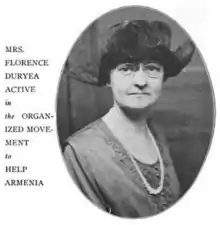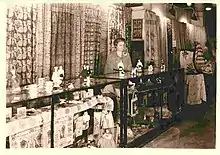Florence Spencer Duryea
Florence Spencer Duryea was an American philanthropist and clubwoman, national secretary of Women's Organizations for Near East Relief, based in New York City.

Personal life
Florence M. Spencer was born on June 30, 1884, and raised in Brooklyn, New York.[1] After her mother's death when Mrs. Duryea 7 years old, she was raised by her grandmother and great grandmother. Hers was a proper Victorian/Edwardian upbringing, which instilled in her manners and morals she practiced throughout her life.
Florence M. Spencer married Edwin D. Duryea in 1911, in Brooklyn.[2] They divorced in 1915.[3] After her divorce, something of which she never spoke (because proper ladies were not supposed be divorced and she had opposed hers), she became involved in philanthropic pursuits.
She was an active Suffragette, a great admirer and distant acquaintance of Mrs. Eleanor Roosevelt, and an active member of her church. She was a member of The Women's Club and the C.L.S.C. of Chautauqua Institution, NY, and also a member of The National Arts Club, NYC, where she resided for a time.
In her later life she lived with her daughter Alice (Esther Razon) and her daughter's family, first in NYC and later in NJ. She delighted in her grandchildren. Toward the end of her life she developed dementia/Alzheimer's and was lovingly cared for by Alice. She died in 1966 from pancreatic cancer.

Career
Florence Spencer began working as a secretary to Rev. S. Parkes Cadman, and then worked in advertising for the Ipswich Mill Company.[4] She was an active member of the New York League of Advertising Women, and a leader of the Salesmanship Club of New York.[5]
From the late 1910s to the late 1940s,[6] Mrs. Duryea raised funds, lectured, and publicized the work of the Near East Foundation in Greece, Turkey, Syria, Georgia, and Armenia.[7] She spoke to women's clubs and highlighted the orphanages, schools, and rehabilitation programs they operated in cooperation with local committees.[8][9] She also organized sales in America, of handicrafts by refugee women, to raise funds.[10][11] "If more American women could only see the sights that I saw, of babies dying in their mothers' arms; of youngsters who still need a mother's care scratching in refuse for a morsel of something to eat; of others so shriveled up from starvation that they more resembled mummies from some ancient Egyptian tomb than anything human," Mrs. Duryea said in 1922, "if they could only see these sights, and worse, I know they would see that America did not forsake a task that up to this time has been so wonderfully done."[12]
Florence Spencer Duryea adopted the child who starred in the 1921 film "Alice in Hungerland," produced by the Near East Foundation.[13] There was controversy, as Rabbi Stephen Wise criticized the adoption, saying the Jewish orphan should be raised in a Jewish home.[14] The girl, raised as Alice Duryea (later Alice Duryea Kinney),[15] remained in Mrs. Duryea's care.[16] Mrs. Duryea also mentored Albanian writer Nexhmie Zaimi after she settled in the United States.[17]
In the late 1920s she was director of the extension division of the Chautauqua Institute.[18]
References
- Untitled news item, Brooklyn Life (December 22, 1906): 16. via Newspapers.com

- "Married" New York Times (August 10, 1911).
- Untitled news item, Brooklyn Daily Eagle (January 16, 1915): 4. via Newspapers.com

- "Western Women Keen for Federation Plan" New-York Tribune (May 27, 1919): 15. via Newspapers.com

- "Near East Relief Needs are Presented" Star Tribune (November 26, 1919): 11. via Newspapers.com

- Margaret Mara, "Near East Foundation Director Reports on Children in Greece" Brooklyn Daily Eagle (June 2, 1947): 11. via Newspapers.com

- "Novice Saleswoman Puts Drive Over Top" Brooklyn Daily Eagle (December 7, 1931): 13. via Newspapers.com

- "$2,000,000 Drive for Greek Relief" New York Times (May 14, 1922): 13.
- "Asks Permanent Aid for Near East" New York Times (September 18, 1921): 25.
- "Near East Relief to Profit by Sale" New York Times (October 30, 1938): D3.
- "Mrs. Duryea Hailed for Near East Aid" New York Times (December 6, 1931): N4.
- "'Save Children of Near East' Pleads Member of Relief Commission" Winona Times (March 3, 1922): 6. via Newspapers.com

- Anat Lapidot-Firilla, "'Subway Women' and American Near East Relief in Anatolia, 1919-1924" in Hanna Herzog and Anne Braude, eds. Gendering Religion and Politics: Untangling Modernities (Springer 2009): 159. ISBN 9780230623378
- "Wants Little Alice Raised as Jewess" New York Times (April 28, 1922): 15.
- "Honoring Alice Duryea Kinney" Near East Foundation (November 19, 2015).
- Alice Duryea of “Alice in Hungerland,” with her adoptive mother, Florence Spencer Duryea (1922); Near East Foundation archives.
- "Miss Zaimi will Marry Mr. Margolis" Brooklyn Eagle (December 29, 1940): B3. via Newspapers.com

- "Woman Rancher Heads Women's Week Plans" Reading Times (March 9, 1929): 9. via Newspapers.com
